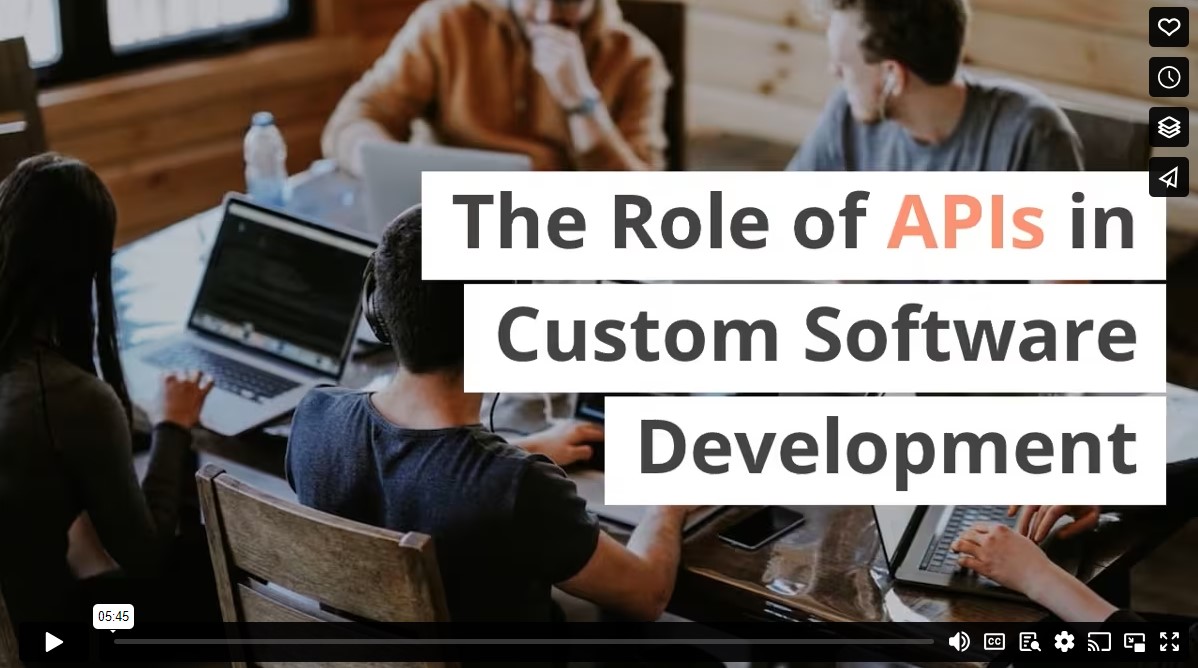APIs are a necessity if you want to build software that meets a user’s needs (and your own, for that matter).
They’re the “middle man” that lets different tools and systems communicate with each other. And this communication is happening constantly — silently in the background — almost every time we use software on any type of device.
APIs are building blocks for the way we create and use technology. Any new business should be rolling out with an API, and it should be built in from the ground up.
From seamless integration to better security to top-notch user experiences, let’s look a bit closer at what an API is and what it can offer.
What is an API anyway?
An API, or application programming interface, is essentially a set of rules that lets two applications access resources, exchange data, and perform various functions. You can think of it as a bridge that connects those two systems.
Instead of needing to know the intricacies of every single software component you want to integrate with, an API is like a shortcut to let you access those features and data in a quicker and easier way.
Here are a few examples of how APIs are used:
- Integrating a business’s software with other software. In its custom software development process, a business can use APIs to integrate data from other software. For example, a travel agency can integrate real-time data from airline and hotel APIs to get their clients the best deals.
- Communication between web browsers and websites. When you’re on a website, your browser (like Chrome or Safari) uses an API to request content from the website’s server and pull it up in your browser window.
- Communication between mobile apps and cloud services. Say you want to use a weather app on your phone to see if it’s going to rain today. When you open the app, it uses an API to request weather data from the cloud service that provides it.
Public vs. private APIs
There are two main types of APIs: public and private. Each has its own uses and benefits in the realm of custom software development.
Public APIs
As you might be able to guess by the name, public APIs are available for anyone to use. They’re also referred to as open APIs or external APIs. There are tons of public APIs out there, like Facebook, YouTube, PayPal, and Shopify, just to name a small few.
Here’s an example scenario: Say a small clothing boutique wants to make a custom app for their customers to shop through. They can use the PayPal API to process customer payments directly through the dashboard, the Shopify API to show customers real-time inventory and fulfill orders, and the Facebook API to integrate Facebook content for shoppers to engage with.
Public APIs do an incredible job of connecting all the different apps and tools that we use on a daily basis, streamlining the user experience and improving the chances that users will stick around and keep using the app.
Private APIs
Private APIs are only available to authorized users. They’re custom-developed for a specific use within an organization. One common use is to connect legacy systems with newer, more modern systems.
Take for example a manufacturing company that’s been using an on-site legacy accounting system for years. It’s a desktop application that runs on a local server. It performs standard functions like storing sales data, tracking expenses, and generating invoices.
But it can’t do more sophisticated functions like generating advanced reports and analyzing data. In this case, a custom API can be used to pull data from the old system into a new custom software that has the advanced data analysis capabilities they’re looking for.
Private APIs can be a total game-changer for brands that have specific, unique needs and goals. Generally speaking, if you can dream it, you can do it.
Benefits of APIs
API development offers huge benefits, like:
- Faster, more efficient software. They can slash development time by offering pre-built functionality and data.
- Better user experience. APIs get users more data and functionality faster. This makes for more personalized and convenient experiences.
- Flexibility and scalability. By easily integrating with other services, APIs can eliminate bottlenecks and leave more room for nimble applications that can scale up more easily.
- More specialization. APIs let businesses tap into the expertise of all kinds of third-party sources. This means more specialized, specific functions without all the extra development work.
- Faster testing and QA. APIs can connect testing tools with systems, helping you to identify and resolve bugs faster and more efficiently.
- Better security. They can control the way users access data and resources, better safeguarding critical information and systems.
- Lower costs. Instead of having to build everything from scratch, developers can use APIs that already perform the functions they need.
- Cross-platform functionality. APIs can separate the function from the platform, making it easier to expand the places your software can be used. For example, you can roll out your web app to mobile, TV, and more.
- Better data control. APIs can gatekeep specific pieces of data, letting you safely share only the right information with customers, partners, or other stakeholders.
Simply put: APIs make software better
Any business that wants to satisfy its customers and stay competitive needs to use APIs. These powerhouses have revolutionized the way we interact and engage with technology — they’ve played a massive role in the evolution of tech that we see today.
When you look closely, you’ll see APIs in pretty much any industry and vertical you can think of: ecommerce, finance, healthcare, transportation, energy, education, augmented and virtual reality (AR/VR), machine learning, blockchain… you name it.
The best part is that they’re virtually limitless. With the right ideas and the right development team to execute them, APIs are a linchpin for developing incredible custom software. Contact Dazlab for expert API development service for your web application/mobile app.
Video





